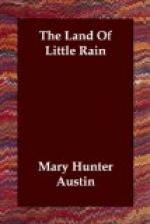There are many strange sorts of humans bred in a mining country, each sort despising the queernesses of the other, but of them all I found the Pocket Hunter most acceptable for his clean, companionable talk.
There was more color to his reminiscences than the faded sandy old miners “kyote-ing,” that is, tunneling like a coyote (kyote in the vernacular) in the core of a lonesome hill. Such a one has found, perhaps, a body of tolerable ore in a poor lead,—remember that I can never be depended on to get the terms right,—and followed it into the heart of country rock to no profit, hoping, burrowing, and hoping. These men go harmlessly mad in time, believing themselves just behind the wall of fortune—most likable and simple men, for whom it is well to do any kindly thing that occurs to you except lend them money. I have known “grub stakers” too, those persuasive sinners to whom you make allowances of flour and pork and coffee in consideration of the ledges they are about to find; but none of these proved so much worth while as the Pocket Hunter. He wanted nothing of you and maintained a cheerful preference for his own way of life. It was an excellent way if you had the constitution for it. The Pocket Hunter had gotten to that point where he knew no bad weather, and all places were equally happy so long as they were out of doors. I do not know just how long it takes to become saturated with the elements so that one takes no account of them. Myself can never get past the glow and exhilaration of a storm, the wrestle of long dust-heavy winds, the play of live thunder on the rocks, nor past the keen fret of fatigue when the storm outlasts physical endurance. But prospectors and Indians get a kind of a weather shell that remains on the body until death.




